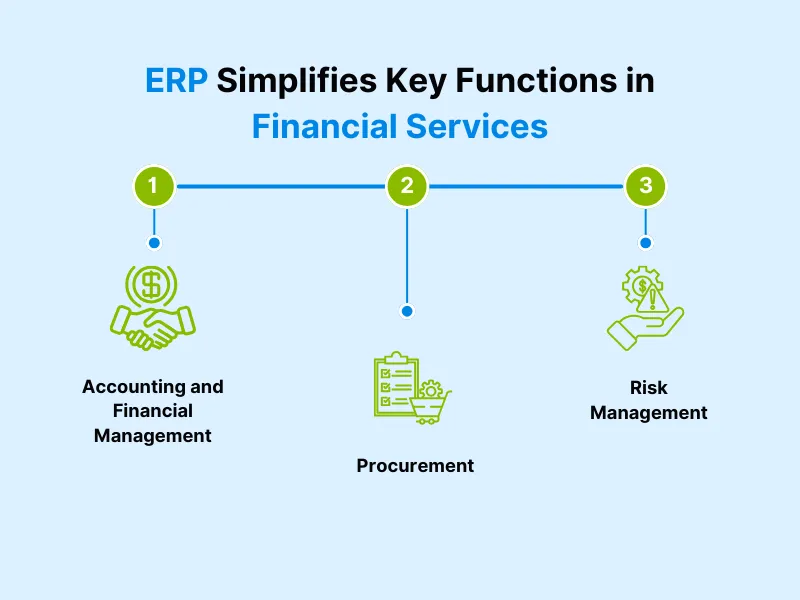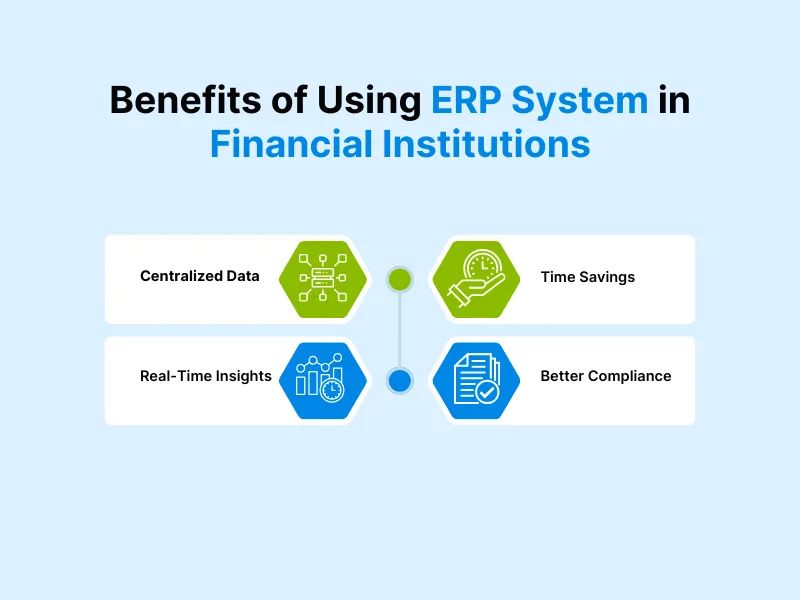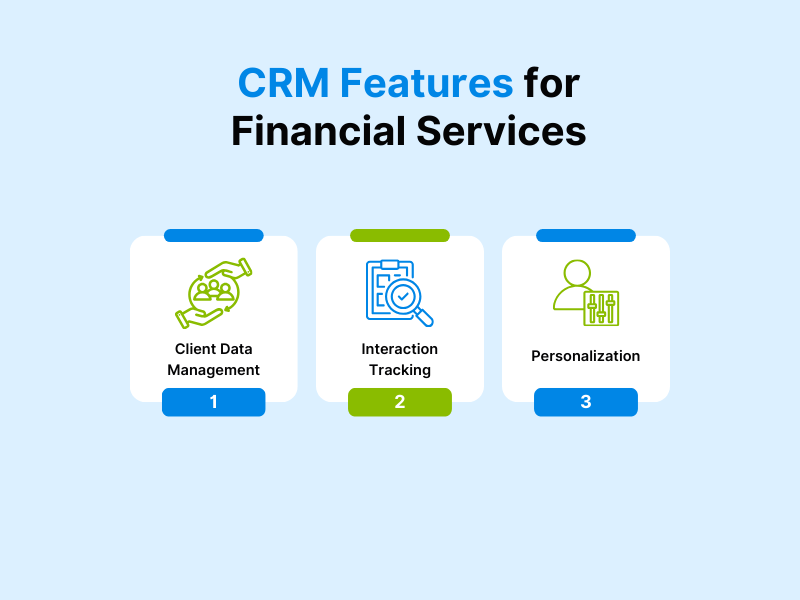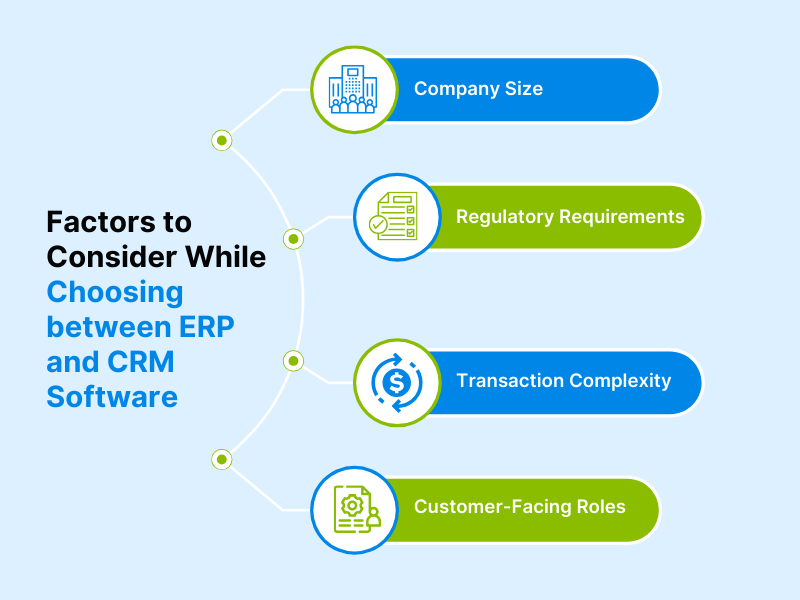ERP vs CRM for Financial Services: Uncovering the Right Approach with Tailored Development
In financial services, getting things right matters—whether it's staying compliant or giving clients top-notch experiences. But many are stuck with outdated systems that just don’t cut it. Software like ERP and CRM keep your back-office operations in check and build better relationships with clients. This blog shows how both systems can transform your business with tailored solutions.

In the financial services industry, precision and efficiency are non-negotiable. Every aspect demands seamless coordination, from meeting regulatory requirements to delivering personalised client experiences. Yet, many institutions find themselves grappling with outdated systems and disconnected processes, which can lead to missed opportunities and operational inefficiencies.
Achieving the perfect balance between personalized client experiences and uncompromised security is no small task—it often boils down to the systems you rely on.
This is where ERP (Enterprise Resource Planning) and CRM (Customer Relationship Management) systems step into the spotlight, playing a crucial role in transforming the financial sector. They safeguard essential information while enabling financial institutions to deliver services with efficiency and precision.
In simple terms:
- ERP software solutions focus on internal processes like accounting, compliance, and resource management, keeping operations smooth and organized.
- CRM software, on the other hand, is all about enhancing customer interactions, nurturing relationships, and driving loyalty.
Both systems bring immense value to financial services by addressing different yet equally important needs. Together, they empower organizations to compete in the finance market with confidence.
This is just an overview of what ERP vs CRM software is all about. This blog aims to be your guide in understanding how ERP and CRM software address the unique challenges of financial services. As you go through, you’ll see how TRooTech’s Custom Software Development Services can build software solutions that perfectly match your goals and drive your business forward.
What Are ERP Systems?
An ERP (Enterprise Resource Planning) system is like having a well-organized digital assistant for your business. It brings together all the important processes—like managing finances, tracking purchases, handling risks, and ensuring compliance—into one system. For financial services, where precision, speed, and regulatory requirements are non-negotiable, an ERP system ensures everything runs smoothly and efficiently.
Instead of relying on multiple tools, an ERP system helps streamline operations, reduce errors, and keep everything in sync, saving time and effort for what truly matters—growing your business.
Wondering how ERP and CRM can boost your financial operations?
We’re Here to Guide You!
How ERP Simplifies Key Functions in Financial Services?

Accounting and Financial Management
Financial institutions manage vast amounts of transactions daily. ERP systems automate processes such as budgeting, financial reporting, and ledger management, ensuring that financial data is accurate and up-to-date.
The numbers have shown that the finance segment captured about 26% of revenue share in 2022, and is expected to grow further at an exponential rate.
Procurement
When it comes to procurement, financial institutions often deal with multiple vendors, contracts, and complex purchasing processes. An ERP system simplifies procurement by creating a centralized platform to manage everything—from tracking purchase orders to monitoring supplier performance.
For the finance sector, where transparency and cost control are crucial, ERP system software ensures every purchase aligns with budgets and compliance standards. It helps in negotiating better vendor terms, reducing unnecessary expenses, and maintaining a clear audit trail. ERP software solutions, when adapted in the right way, could transform procurement into a seamless, efficient process, making it the ideal solution for financial institutions aiming to save time and stay organized.
Risk Management
In the financial sector, where risks are inherent in almost every decision, risk management is of paramount importance.
ERP systems are designed to assist financial institutions by providing a comprehensive solution for identifying, assessing, and mitigating potential risks across various business functions. From market volatility and fraud prevention to operational inefficiencies and data integrity, ERP systems streamline the entire risk management process.
These systems centralize and analyze vast amounts of data in real time, helping financial institutions spot emerging risks quickly. ERP reduces the likelihood of human error and ensures that risks are managed proactively by automating tasks like monitoring transactions, investments, and compliance.
With built-in predictive analytics, ERP solutions empower organizations to make informed, calculated risk decisions, allowing them to stay stable during unpredictable market conditions while safeguarding their assets.
Furthermore, ERP systems enable institutions to enforce standardized risk management protocols, ensuring consistency across departments and reducing the chances of regulatory violations or financial losses.
Compliance
The financial sector faces an intricate web of regulations designed to ensure stability, transparency, and accountability. ERP systems are proving to be invaluable tools for the financial sector to adhere to these regulations, helping organizations track and manage compliance with ease.
Some of the most critical compliance frameworks financial institutions must adhere to include:
Basel III
One of the most prominent regulatory frameworks, Basel III, aims to strengthen bank capital requirements and introduce new liquidity requirements. It requires financial institutions to maintain sufficient capital reserves, which is critical for absorbing shocks during times of financial stress.
ERP systems can facilitate compliance with Basel III by automating capital adequacy calculations, tracking liquidity ratios, and generating compliance reports. This helps banks meet regulatory standards and avoid penalties.
GDPR (General Data Protection Regulation)
The GDPR requires financial institutions to ensure customer data is securely stored, processed, and protected, with strict guidelines on data access and deletion. ERP systems integrate data privacy features like data encryption, access controls, and audit trails, ensuring institutions can manage customer data in compliance with GDPR.
PCI DSS (Payment Card Industry Data Security Standard)
PCI DSS sets the security standards for organizations that handle credit card transactions. Financial institutions must ensure secure transaction processing, protect customer payment data, and maintain continuous vulnerability management. ERP systems can enhance PCI DSS compliance by securing payment data through encryption, managing access controls, and automating security audits.
The numbers highlight that the global average cost of a data breach has reached nearly $4.9 million this year, marking a nearly 10% increase from $4.5 million in 2023.
How ERP Benefits Financial Institutions?

Implementing an ERP system in financial institutions can bring significant improvements in efficiency, decision-making, and compliance.
Let’s explore some key benefits:
Centralized Data
ERP systems centralize all financial data in one place, which makes it much easier for teams to access and analyze the information. This centralized approach simplifies reporting and improves accuracy. Studies have shown that organizations with centralized data experience faster decision-making and more accurate insights, helping them respond to challenges swiftly.
Time Savings
Manual tasks like data entry, tracking invoices, and compiling reports can take up a lot of time. ERP systems automate many of these processes, freeing up employees to focus on more strategic work. Financial institutions save not only time but also reduce errors that might arise from manual data handling. This efficiency leads to significant cost savings over time, allowing staff to dedicate more effort to valuable tasks that drive growth.
Real-Time Insights
For financial institutions, the ability to make informed decisions quickly is crucial. ERP systems offer real-time data, meaning managers and executives always have the latest information at their fingertips. With real-time insights into finances, risks, and market conditions, organizations can react quickly and make data-driven decisions that keep them ahead of the competition.
Better Compliance
One of the most pressing concerns for financial institutions is staying compliant with constantly evolving regulations. ERP systems help by tracking transactions automatically, providing up-to-date compliance reports, and streamlining audits. These systems can be tailored to ensure that institutions meet specific regulations like Basel III, GDPR, or anti-money laundering standards. By automating compliance tasks, ERP systems help reduce the risk of penalties and fines, improving overall audit readiness.
AI Is Changing Construction—Are You Ready To Lead The Way?
Take the next step towards smarter construction processes
What is CRM in Financial Services?
Financial institutions are handling other people’s money, which means trust and security are at the forefront of every interaction, which calls for a strong relationship with clients.
Customer Relationship Management (CRM) system acts as the backbone for client management, bringing everything together in one platform. It allows financial institutions to efficiently store and manage client data, track interactions, and personalize services—all while maintaining the highest level of security and compliance.
Essential CRM Features for Financial Services:

Client Data Management
CRMs store detailed profiles of clients, including their financial history, preferences, and personal details. This centralized database makes it easy for businesses to access and update information, ensuring all team members are on the same page.
When comparing CRM vs ERP, it's clear that CRM systems are specifically built for managing customer information and relationships, while ERP systems focus on broader operational functions.
Interaction Tracking
CRMs track every interaction with clients, whether it’s a phone call, email, or in-person meeting. This ensures that financial institutions have a comprehensive history of each client’s journey, making it easier to offer personalized service.
Personalization
A CRM system can analyze client data to recommend tailored products and services. Financial institutions can offer more relevant solutions, improving customer satisfaction and loyalty by understanding each client’s specific needs.
Whether it's CRM software for SaaS or a more complex system, CRM solutions help deliver customized service, a key factor in client retention.
Looking to keep your customers happier and loyal?
It’s All About the Right CRM
Top benefits of CRM for Financial Institutions
Personalized Customer Service
With a CRM, financial institutions can provide more personalized interactions, ensuring that clients feel valued and understood. When clients receive services tailored to their needs, they’re more likely to stay with the institution long-term. CRM Software Development has made it possible for these systems to integrate seamlessly with financial services, enhancing client relationships.
Automated Client Follow-Ups
CRMs automate follow-up tasks, so clients never feel neglected. For example, after a meeting or transaction, the CRM can automatically send a thank-you note, schedule a follow-up, or alert staff about the next steps. This level of automation saves time and ensures no client interaction is overlooked.
In contrast, ERP system software focuses on managing back-end tasks like inventory and accounting, but CRM takes care of client-facing interactions.
Retention Strategies
CRM systems help identify clients who might be at risk of leaving, based on their behavior or transaction patterns. By spotting these trends early, financial institutions can implement strategies to re-engage these clients, such as personalized offers or special incentives, to prevent churn.
Relevant Technology Frameworks
To maximize the potential of CRM systems in financial services, institutions often rely on advanced technology frameworks designed to meet the specific needs of the industry.
Here are some of the leading CRM solutions:
Salesforce Financial Services Cloud
Salesforce offers a specialized CRM platform for the financial sector. It integrates client data, provides personalized recommendations, and automates key processes like financial planning and reporting, helping financial institutions improve client satisfaction and operational efficiency.
Microsoft Dynamics 365 Customer Engagement
This CRM solution connects financial services with clients through a seamless experience across various touchpoints. It enhances customer service, enables personalised marketing, and automates key workflows. With its integration into the broader Microsoft ecosystem, it offers robust data analytics and collaboration tools.
Zoho CRM
Zoho is an affordable and easy-to-use CRM system for smaller financial institutions or those with simpler needs. It offers lead management, analytics, and email marketing, among other features. Zoho helps financial institutions manage their customer interactions and gain valuable insights to drive growth.
ERP vs. CRM: Key Differences
When it comes to choosing between ERP vs. CRM systems, it’s important to understand that these two tools serve distinct but complementary roles in a financial institution’s operations. Both are essential for improving efficiency and streamlining processes, but they cater to different aspects of the business.
CRM software focuses primarily on customer relationships. It helps businesses track and manage interactions with clients, store detailed client profiles, and support sales and marketing teams in driving customer satisfaction and loyalty.
On the other hand, ERP system software is designed to manage internal business processes such as accounting, inventory, human resources, and supply chain management, providing a unified view of operations across various departments.
Feature-by-Feature Comparison: ERP vs CRM for Financial Services
Feature | ERP System | CRM System |
Purpose | Manages internal operations (finance, HR, supply chain) | Manages customer relationships and sales |
Primary Users | Finance, HR, Operations teams | Sales, Marketing, and Customer Service teams |
Data Focus | Operational and financial data | Customer data, including interactions and preferences |
Process Coverage | Accounting, inventory, HR, project management | Customer support, lead generation, sales tracking |
Integration | Integrates various business functions (e.g., finance, supply chain) | Integrates with sales, marketing, and customer service tools |
Key Benefits | Streamlines business processes, improves decision-making | Enhances customer service, boosts sales, and builds long-term relationships |
Customization | Can be customized for specific industries (e.g., construction, manufacturing) | Customizable to customer engagement processes (e.g., automated follow-ups, personalized messaging) |
Still not sure about which one is best for your business?
Here are some factors to consider while choosing between ERP and CRM software:

Company Size:
Smaller firms might only need a CRM to keep track of customers, while larger organizations may require both an ERP and CRM software to manage internal and external operations smoothly.
Regulatory Requirements:
If your financial institution needs to meet strict compliance regulations, an ERP system can help streamline financial reporting and audits. However, CRM is more focused on managing customer-facing data like KYC (Know Your Customer).
Transaction Complexity:
For businesses handling complex financial transactions, ERP software solutions help manage everything from accounting to inventory. On the other hand, if you're focusing on relationship building, CRM keeps track of all client interactions.
Customer-Facing Roles
If your institution needs to manage client interactions, track leads, and improve customer service, then CRM software is essential. For managing back-office processes, ERP software is the go-to solution.
In the fast-paced financial sector, operational efficiency and exceptional client experiences are paramount. Yet, when ERP (Enterprise Resource Planning) and CRM (Customer Relationship Management) systems operate in silos, businesses face data inconsistencies, manual redundancies, and fragmented workflows.
Integrating these two systems provides a holistic, unified solution, enabling financial organizations to streamline processes, enhance decision-making, and elevate customer satisfaction.
Not sure if ERP or CRM is the right fit for you?
Let’s Find the Best Solution Together
Why ERP-CRM Integration Is the Best Bet for Financial Services?
In the fast-paced financial sector, operational efficiency and exceptional client experiences are paramount. Yet, when ERP (Enterprise Resource Planning) and CRM (Customer Relationship Management) systems operate in silos, businesses face data inconsistencies, manual redundancies, and fragmented workflows.
Integrating these two systems provides a holistic, unified solution, enabling financial organizations to streamline processes, enhance decision-making, and elevate customer satisfaction.
Unified View of Clients and Operations
Integrating ERP and CRM creates a seamless flow of information between back-end financial processes and front-end customer interactions.
This holistic approach allows financial institutions to:
- Access a 360-degree view of client profiles, combining customer data from CRM systems with financial details from ERP platforms.
- Monitor operational efficiency, such as transaction lifecycles and payment histories, alongside customer engagement metrics.
- Align sales and finance teams by giving them shared, real-time access to accurate data.
Enhanced Data Consistency and Accuracy
Without integration, financial data often requires manual syncing between systems, increasing the risk of duplication and errors.
An integrated ERP-CRM system ensures:
- Data consistency as the information is pulled from both the platform and from a single source of truth, eliminating discrepancies.
- Real-time updates as changes made in one system instantly reflect in the other, enabling informed, timely decisions.
- Accurate records across systems simplify adherence to financial regulations and reporting standards.
Automation for Greater Efficiency
Repetitive manual tasks drain resources and leave room for error. ERP-CRM integration supports automation, allowing financial institutions to:
- Generate invoices directly from CRM-based sales records.
- Automatically update inventory levels, payments, and customer histories across systems.
- Enable workflows like lead-to-cash, where CRM quotes seamlessly convert into ERP orders.
Smarter, Data-Driven Decision-Making
In financial services, having the right insights at the right time is critical. ERP-CRM integration enhances decision-making by providing a comprehensive view of:
- Customer behaviours can be analysed by accessing
- Detailed purchase histories, preferences, and financial activity to tailor personalized services.
- Cash flow, profit margins, and resource allocation to optimize operations.
- Identifying patterns in client interactions and financial performance to predict trends and address risks proactively.
Building on these benefits, let’s look at a real-world example of how integrating ERP and CRM systems can create tangible value in the financial sector.
Curious about how ERP and CRM work together?
We Make Integration Simple
Case Study 01: Integrating SAP (ERP) and Salesforce (CRM) for Financial Excellence
Financial ecosystems face the challenge of managing complex operations while ensuring exceptional customer experiences. Integrating SAP ERP, a robust enterprise resource planning system, with Salesforce CRM, a leading customer relationship management platform, offers a powerful solution for financial service providers.
The Challenge:
A mid-sized financial institution struggled with fragmented workflows and siloed data. Their SAP ERP system efficiently handled core financial operations—such as budgeting, reporting, and compliance—while Salesforce CRM excelled in managing customer interactions, sales pipelines, and service inquiries.
However, the lack of integration between these systems led to:
- Data silos: Teams worked with inconsistent and incomplete data, causing delays in decision-making.
- Manual processes: Finance and sales teams had to duplicate data entry, increasing the risk of errors.
- Limited customer insights: The finance team couldn’t access CRM insights, while the sales team lacked visibility into clients’ financial profiles.
These inefficiencies not only slowed operations but also hindered the institution’s ability to provide seamless, personalized customer service.
The Solution: SAP and Salesforce Integration
The institution implemented an integration framework connecting SAP ERP with Salesforce CRM.
Using middleware tools like MuleSoft and APIs, the systems began sharing real-time data.
This integration enabled:
- Bidirectional data flow: Customer records, payment histories, and transaction data are synced automatically between the two platforms.
- Process automation: Tasks like generating invoices, tracking payment statuses, and updating customer profiles became automated.
- Unified dashboards: Teams accessed a single source of truth for both operational and customer-facing data.
Key Benefits Achieved
Streamlined Loan Management
The integration allowed loan officers to access complete customer profiles in Salesforce, enriched with payment histories and credit scores from SAP.
Enhanced Financial Forecasting
By combining Salesforce’s sales pipeline data with SAP’s budgeting and revenue modules, the finance team improved cash flow visibility through accurate revenue projections. They also further enhanced the ability to align sales forecasts with operational budgets.
Better Client Engagement
Salesforce CRM enriched by SAP data empowered the relationship managers with detailed insights into clients' transaction patterns, enabling tailored recommendations. Real-time updates on account statuses helped them to address concerns proactively.
Regulatory Compliance Made Easier
The integration ensured seamless data sharing for compliance and audit purposes. All client financial data, including contracts and payment records, was consolidated in SAP, while Salesforce tracked customer interactions.
The Role of Custom Development in Adapting ERP and CRM for Financial Needs:
Financial services can’t rely on generic, off-the-shelf ERP and CRM solutions. These platforms are great for basic operations, but financial institutions have unique challenges—like massive data volumes, strict compliance regulations, and the constant need for top-notch security.
Custom development can help by tailoring these tools to your specific needs and making them work harder for you.
Why is Custom Development Essential in Finance?
Customization ensures your ERP and CRM systems don’t just fit into your workflow but actively enhance your Financial services offerings.
Here’s how:
Enhanced Data Security
Financial firms deal with highly sensitive information—client details, transaction data, investment records, and more. Custom-built encryption protocols, secure APIs, and role-based access control ensure data stays protected and compliant with regulations like GDPR or SOX.
Seamless Regulatory Compliance
Regulations in finance are non-negotiable, and failing to meet them can lead to hefty fines or worse. With custom workflows and automated compliance checks, you can ensure audit-ready documentation, streamlined reporting, and adherence to industry standards without extra manual effort.
Efficient Data Handling
Financial services generate enormous amounts of data, from customer profiles to transaction records. Standard systems may not keep up. Custom solutions optimize how data is stored, processed, and accessed, ensuring smooth operations even under heavy workloads.
Personalized Reporting
Financial teams need detailed, real-time insights to make decisions quickly. Custom reporting modules let you generate tailored dashboards that focus on KPIs most relevant to your business—like profit margins, risk exposure, or investment performance.
Customizing ERP and CRM systems requires employing the right technologies.
Here's some of the industry-best technology that is implemented:
Custom API Development
APIs are the glue that connects your ERP, CRM, and other business tools. Using frameworks like Flask for Python or Express.js for JavaScript, developers can create APIs that enable seamless data exchange.
For instance, syncing real-time transaction data from your ERP to your CRM ensures that your sales team always has up-to-date customer insights.
Cloud Platforms for Scalability
Platforms like AWS, Azure, and Google Cloud offer the scalability and flexibility financial services need. Cloud platforms allow you to scale up or down seamlessly handling a spike in transaction volumes or managing complex compliance workflows.
To get a better understanding of the impact of custom ERP and CRM development, let’s explore some case studies:
Case Study 02: A Legal and Wealth Management Platform
A financial client in Australia needed a platform to handle asset tracking, financial statement generation, and compliance management.
For this TRooTech, a top-notch software development company, delivers a cloud-based system with advanced search features, multi-user management, and third-party API integrations like DocuSign for digital signatures.
Outcome: The platform not only streamlined their operations but also improved data accessibility and compliance, boosting efficiency and reducing manual work.
Case Study 03: Fulton & Roark’s ERP Transformation
A growing retailer needed a solution to handle inventory tracking and financial workflows.
To tackle this they hired Software Developers to implement NetSuite ERP with custom workflows tailored to their business.
Outcome: They eliminated manual data entry, improved inventory accuracy, and grew sales by 50% without increasing staff.
Why do We emphasize Financial Software Development Customization?
The financial sector not only handles the basics but also addresses the intricacies of your operations. Customizing ERP and CRM systems isn’t just about improving efficiency—it’s about building systems that empower your business to grow, adapt, and succeed in an ever-changing forefront.
With custom development, your ERP and CRM become more than just software—they become strategic assets that drive smarter decisions, ensure compliance, and secure your competitive edge.
Want to see how others are winning with ERP and CRM?
Real Results, Real Success Stories
Case Study 04: Microsoft Dynamics 365 for an Energy Technology Company
The Challenge
A leading energy technology company, operating for nearly 150 years, needed a robust ERP solution to streamline its financial and operational processes. The company faced a critical challenge: deploy a centralized, cloud-based ERP system in just two months to support the launch of new products while ensuring real-time data integration for financial insights and operations management.
The Solution
UST, a global tech services firm, implemented Microsoft Dynamics 365 Finance & Operations, a cloud-native ERP and CRM suite. The solution offered out-of-the-box capabilities while being tailored to their unique needs, including integration with their existing field service data and business intelligence systems.
Key technologies used included:
- Data Analytics Tools: Real-time financial insights and performance tracking through built-in analytics.
- Cloud Platform: Scalable infrastructure via Microsoft Azure, providing centralized access and cost efficiency.
- Automation: Streamlined workflows to reduce manual processes and improve accuracy.
The Impact
- Real-time data access enabled employees to make informed decisions instantly.
- Executives could view up-to-the-minute financial, sales, and inventory data.
- Automated workflows increased productivity and reduced operational costs.
Despite the aggressive timeline, the system was successfully implemented, aligning operations with the company’s strategic goals.
This example underscores the value of integrating ERP and CRM systems, especially in high-stakes environments like finance. Customization and the right technological tools ensure that even out-of-the-box solutions can address specific business challenges effectively.
The Next Wave of ERP and CRM Technology: Predicting The Future
As the financial industry evolves, so does the role of technology in driving efficiency, transparency, and smarter decision-making. When it comes to ERP vs CRM, the integration of these systems has already made its mark but the future is even more exciting.
From AI-driven insights to predictive analytics and blockchain, the next generation of ERP system software and CRM software solutions will take financial management to new heights.
AI-Driven Insights
Artificial Intelligence is making business decisions more intelligent. With platforms like TensorFlow and Keras, CRM software is now able to analyze customer behaviours, predict future trends, and automate decision-making processes, making it possible for financial services to act proactively rather than reactively.
Predictive Analytics
Tools like Power BI and Tableau are being enhanced by AI to give businesses the power of predictive analytics. They provide financial leaders with insights into future trends, allowing them to make data-driven decisions that minimize risk and maximize profitability.
Blockchain for Transparency
Blockchain is reshaping ERP for construction and other sectors by ensuring that transactions are transparent and traceable. Platforms like Ethereum and Hyperledger enable secure, immutable records, improving data accuracy and reducing fraud risks in financial services.
As these technologies continue to develop, the potential for custom software development services to tailor these innovations to specific business needs is enormous.
Top software development companies like TRooTech are backed by experts who specialize in integrating cloud ERP solutions, CRM software for SaaS and other emerging technologies to create highly customized systems that meet the unique needs of your financial business.
Make the Right Choice for your next success
When it comes to selecting the right ERP and CRM solution for your financial services business, the decision is crucial for long-term success. Here's what to keep in mind before making your choice:
- Identify the key functionalities your business needs.
- Customization Is Key.
- Opt for cloud-based ERP solutions that grow with your business.
- Integration with Existing Tools
- Security & Compliance
Look for a provider like TRooTech that offers long-term support, ensuring your systems evolve with emerging technologies like AI-driven insights and blockchain.
In the end, making the right choice will set the stage for future success. By considering these key factors, you can make a decision that not only meets your current needs but also prepares your business for growth.
Wondering how custom ERP/CRM solutions can transform your business?
Let’s connect! Book a free consultation with our experts today, or if you’re ready to take the next step, hire our skilled developers to develop a solution tailored just for you. We’re ready to support your growth.
FAQs
TRooTech specializes in building tailored ERP and CRM systems for the financial sector. We understand the unique challenges you face, from compliance to data security, and we design solutions that meet your exact needs. TRooTech gets you a system that works seamlessly for your business, helping streamline operations and improve efficiency.
Data security is critical, especially in finance. At TRooTech, we implement advanced security measures like encryption, multi-factor authentication, and compliance with standards like GDPR. We ensure your custom ERP/CRM systems are built with the highest security protocols to protect sensitive financial data and maintain client trust.
Yes! TRooTech integrates automation tools like UiPath into your custom ERP and CRM systems. This helps eliminate repetitive tasks—like invoicing and data entry—saving time and reducing human error. With automation, your team can focus on more important tasks, driving productivity and improving service efficiency.
ERP systems manage your internal processes like accounting, financial management, and compliance, while CRM systems focus on managing customer relationships and sales. TRooTech builds both systems to work together, ensuring your financial business runs smoothly internally while delivering excellent customer service.
TRooTech’s expert developers specialize in creating custom ERP and CRM solutions designed specifically for financial businesses. We can seamlessly integrate real-time analytics, add workflow automation, or ensure data security, we’ll tailor your system to meet your business needs. Our team stays updated on the latest technologies to provide you with the best possible solutions, from AI-driven insights to blockchain transparency.

